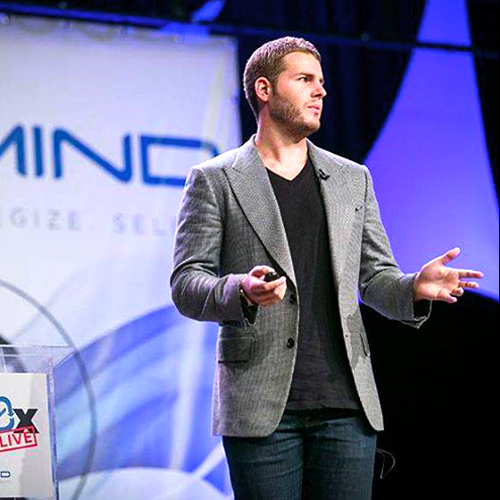He’s edgy, a bit brash, super cool, and, oh yeah, a multimillionaire. So how do you go from getting out of the Air Force at age 23 with nothing and no real plan for life to becoming abundantly wealthy a year later? Just ask Alex Becker. Now, just a few years removed from his days in the military, the young entrepreneur owns multiple online businesses, and he wants to show everyone how they can do what he did.
“I became an entrepreneur because I truly did not have any other option,” Becker
Becker walks through the steps of how he did it in his debut book, The 10 Pillars of Wealth: Mind-Sets of the World’s Richest People (Brown Books Publishing Group). In this no-nonsense roadmap to building wealth as an entrepreneur, the straight-shooting Becker may step on a few toes and ruffle some nerves along the way as he gives readers his up-close and personal action plan to financial freedom and abundant wealth.
HBM: You came to a crossroads in life when you got out of the military. What pushed you to take a risky road toward entrepreneurism?
Becker: I became an entrepreneur because I truly did not have another option. The firefighting skills I learned in the Air Force did not qualify me for any jobs on the outside. Because of this, I took massive action and spent countless hours learning how I could make a living through Internet marketing. Not having a sustainable income and having no other option gave me the “gun-to-the-head” motivation to ignore the “risk” and go all in. What most people will find, though, is that taking the “entrepreneur” route actually can be fairly risk-free and far more consistent than they imagine.
HBM: What do you tell people who think becoming a self-made multimillionaire is just for a select few?
Becker: Many people believe this because they have no real-world experiences with actual millionaires, so they simply believe what they hear. And what they normally hear is that becoming a millionaire is something only a lucky, genius few can achieve and that it is some statistical lottery. However, that sort of thinking is not based on any real-world experience and reflects more the opinions of “non-millionaires.” On the contrary, I have met hundreds, maybe thousands, of self-made millionaires, and I just have too damn much proof based on firsthand experience that anyone can do it. I’ve met once-homeless people who now make $100,000 a day. I’ve met a person whose first 10 businesses failed and who everyone labeled a loser; he is now worth $500 million. I have met 15-year-old millionaires. I have met single, middle-aged mothers who have become millionaires. I have met 60-year-old men who retired and began working online and created million-dollar businesses. I’ve met geniuses who are millionaires, but most of the millionaires I have met are very average people with average minds and above-average mind-sets that allow them to chase their dreams.
Long story short, I have met millionaires from almost every walk of life over and over again. I’ve even watched the transition from being broke to becoming a millionaire as it’s happened. Nothing from the vast experience I have points to this being a way of life for just a “select few,” while everything I have experienced emphasizes that it can be done by just about anyone who sets his or her mind to it.
HBM: When separating time from money, what is the most important thing to know?
Becker: Too many people think about money as something you earn from work. The downfall of this is you only have so many hours, and unless you are LeBron James, your value per hour greatly restricts your income. You have an extremely limited amount of hours you can work every day, and this limits your income. What you must do is immediately separate your time from your income.
This is done by creating systems that work while you are not there. For example, if you understand how to create profitable Facebook ads, you can spend one hour setting up your ads, and then the ads can continue to make money for you even while you are not there. Whether you have one ad or thousands of ads, running it makes zero difference time-wise but all the difference money-wise. You can also separate your time from your income by having a staff run your business. Heck, in the above example, you could figure out the ad formula and then hire a team of three people to scale it. I have a friend who makes a million dollars a month from his skin care business, and his staff operates it for him while he focuses on other parts of the business.
In short, focus on building systems that can deliver profit with or without you there. Then focus on investing that money to create passive income. For example, Mark Cuban makes millions of dollars a year from investments that require zero time on his part.
HBM: How does a “victim mentality” manifest itself in holding an entrepreneur back from creating wealth?
Becker: People love to put responsibility for their happiness, wealth and success in someone else’s hands. This is because it is much easier to do that than to hold yourself accountable. Blaming the government, the economy, a bad employee or other outside force is much more comfortable than looking in the mirror and admitting you are a lazy sack of crap who’s not working to your potential. This is the mind-set of a person who has given up control of his or her life, and too many entrepreneurs try to bring this mentality with them when starting a business.
The problem with this mentality is that when you think like this, you give up control. When responsibility is placed on other factors that are outside of your control, many times those factors will come and bite you in the ass, and this is from where the perceived risk of entrepreneurship stems. You see, in business, even when it’s someone else’s fault or caused by something else, YOU are the one who takes the hit money-wise.
A successful entrepreneur takes on as much fault as possible, and this leads to taking as much control as possible. This, in turn, leads to vastly reducing the chance of failure in the business.
For example, when I first started my business, we would have massive product launches. During these events, our servers would crash almost every time, and I would blame the hosting company and take a victim mentality. Even though it was their fault, I was the only one who lost money. Then, one day, I got rid of this mentality, took the blame from the host, and set up dozens of fail-safes that we could use to keep our sites up if the servers crashed. The result? I made much more money. I made more because I took control away from outside forces and brought it back under my responsibility.
Too many people who start a business don’t understand this, and because of this, they blame others all the way to their bankruptcy and business closing.
HBM: The 6th Pillar is Forgetting “What if” and Focusing on “What Is.” In your experience, how have you seen “perfection paralysis” dictate the path of a person’s life?
Becker: People who are broke or hate their job or want to be successful are stopped from creating successful businesses because they are busy trying to prevent problems that never happen and ignoring their current problems.
For example, I see too many people starting a business while worrying about how people might respond to their sales pitches, potential future legal issues and countless other tiny details in order to make things “perfect.” The problem is that their problem right now is that they don’t have any customers and are not generating any money. However, they ignore this initial problem, which is very real and immediate, in order to focus on problems that will never happen.
What people need to realize is that by trying to make it perfect on the first go, you are actually harming your business, because every second that you are not getting customers is a second you are losing money and time. What most people also find is that the problems they were preparing for, or worried about, never happen. This is ironic because usually, a lot of other unexpected problems appear for which they have not put plans in place. So, in the long term, it’s much better to get it “good enough,” get some money in and then focus on correcting the real problems that occur instead of delaying to get it “perfect” and preparing for imaginary problems that will probably never happen.
HBM: You stress goal setting as imperative in the map toward creating wealth. What does this look like in terms of breaking down a success-moment goal into smaller action steps?
Becker: People tell me all the time that they want to be a millionaire. The problem is that they have no plan to get there, and this results in them “flailing about” business-wise and taking nonobjective actions. This leads to actions that do not move them in any one direction.
Let’s imagine I want to have a real estate business that makes a million dollars per year. What I need to do is outline the steps that will help me reach that goal. An example of this could be to first map out the bare minimum of what I need to learn and obtain in order to sell houses. Next, I need to determine how many houses, at an average revenue per house, I need to sell per year to reach a million dollars. Once that number is determined, I must find out how many phone calls it takes to get a potential homebuyer and how often they convert to buying a home.
Let’s say that for every 10 phone calls, we get one potential customer, and one out of every five customers buys a home, with a profit of $20,000. (I am not in real estate, so I am just making up these numbers.)So in order to make $20,000, we need to make 50 phone calls with that conversion rate. This also means we need to close 50 deals at $20,000 to make a million dollars a year. That converts to making 2,500 sales calls a year minimum to hit our goal.
While these numbers are not exact, this gives us a very clear path to getting paid. This is “pick up the damn phone and make 2,500 calls.” Our revenue goal is broken down step-by-step, and we have areas we can clearly work on to hit it. We can, of course, find ways to improve these numbers, but what we have here is a clear-cut path and goals that will get us to our ultimate goal. Every action from now on should correlate to these goals.
Most entrepreneurs fail to map out this detailed plan and instead will just randomly take action and get random results. By setting goals like we did above, we take away the randomness and gain clarity.
HBM: Why is it difficult for entrepreneurs and business owners to delegate responsibility, and why is it important to do so?
Becker: Most entrepreneurs start their businesses as a one-man show and handle every part of the business. While this shows great work ethic, as the business grows, it plateaus because instead of spending time growing the business, the entrepreneur ends up spending time managing the business. For example, I used to spend one to two hours a day doing customer support. This is time lost from creating new ads and creating new products, which lead to more money. It’s common sense that if I hire someone to do this task, I can spend my time generating far more money than it takes me to pay the person.
Most entrepreneurs know this, but they do not know how to give up responsibility, and this leads to a poorly run business that stretches them too thin. They do this because they do not know how to train people properly and are uncomfortable giving away jobs that they handle to someone new. This would be similar to a mother hiring a nanny to take care of her child. At first, letting go of your roles is hard.
In the end, however, your job as a leader is to move the business forward. If you are stuck handling invoices or answering emails, you are not moving the business forward. It is far better to grow a well-run business to $10 million a year and get 50 percent of the profits than it is to get stuck at $1 million a year doing it all yourself with 100 percent of the profits.
HBM: How does your 9th Pillar of wealth, People Give Money to People That Get People, illustrate how money is power over people?
Becker: At the end of the day, money is simply a number that people made up to handle value. When you think about it, a mega millionaire is simply someone who convinced other people to give him this value. That’s all it is.
So, what you need to understand is that in order to create a large business, you have to understand people. You have to understand what they want, how they think, and how they perceive value in order to convince them to give you value back in the form of “money.”
Too many people try to create businesses that make money but then forget that money is people. They ignore how to sell to people, how to lead people, and how to influence people because they are focused on money. Money is nothing without people. Understand people, and you will be able to attract money.
HBM: Do you hang out with likeminded entrepreneurs?
Becker: Yes; almost every day, I talk to other entrepreneurs similar to myself with likeminded ambitions. What I try not to forget is that I want to find entrepreneurs who are more successful than I am and think differently than I do. A person who makes $10 million a year thinks very differently than a person who makes $100 million. You must constantly be focused on coming into contact with people who have different views and mind-sets than your own.
HBM: Even though you blazed your own entrepreneurial trail to wealth, whom do you consider your mentor?
Becker: A good friend of mine named Com Mirza, who is worth $500 million, was one of my first major mentors. I have many other mentors who are less successful but have contributed to my success nonetheless, such as Don Wilson and Mario Brown. I am constantly trying to find new mentors to help me grow.
About Alex Becker
Alex Becker is the influential entrepreneur behind software brands including Source Wave and Market Hero. As the founder of many diverse, successful online businesses, he achieved a net worth of over $1 million while his peers were just finishing college. Now, though still in his 20s, Becker leads educational events, online training programs, and a multi-media academy that have helped thousands establish professional independence and financial health.
Through his debut book, The 10 Pillars of Wealth: Mind-Sets of the World’s Richest People (Brown Books Publishing Group), he’s expanding his mission to reach aspiring entrepreneurs in every corner of the globe. Becker’s new release exposes “pillars” that reinforce everyday actions, reveals the keys to elevating your professional and personal ethos, and gives you the tools to leverage your leadership skills.
Providing a roadmap to true independence, Becker delivers actionable strategies – and unapologetically challenges the staid majority. Tap into his no-nonsense resources for building financial freedom as an entrepreneur at AlexBecker.org.
Find a Home-Based Business to Start-Up >>> Hundreds of Business Listings.

















































